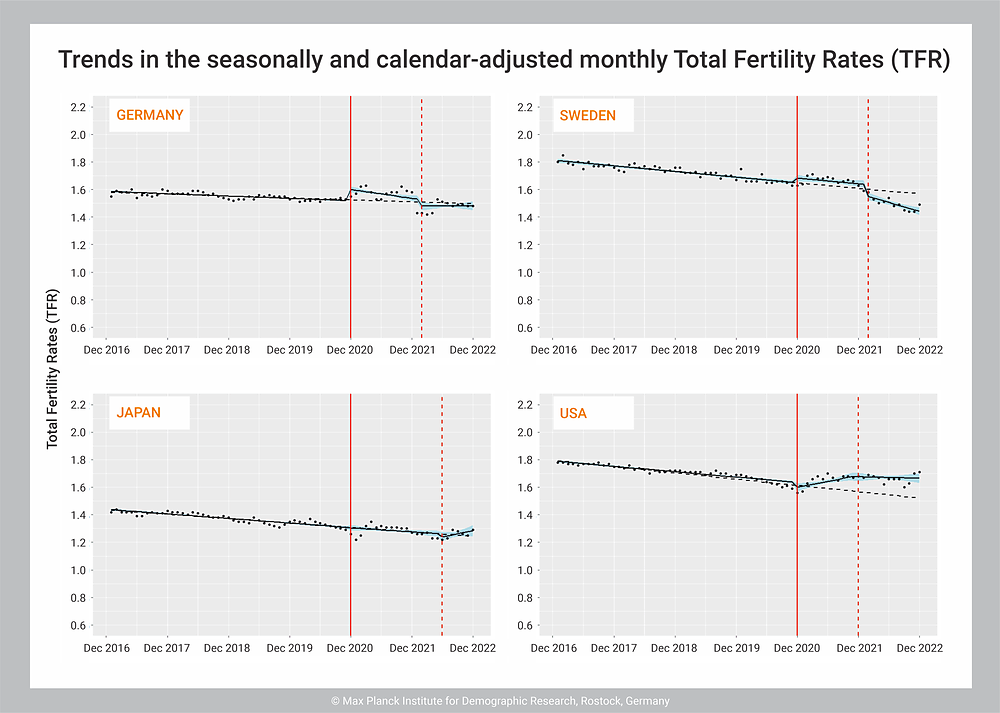March 17, 2025 | News
How have Covid-19 vaccinations affected birth rates?
MPIDR researchers study fertility decline in response to the start of the Covid-19 vaccination campaign
A recent study by the Max Planck Institute for Demographic Research (MPIDR) found a link between the introduction of Covid-19 vaccination and a decline in fertility rates nine months later, with behavioral changes likely being the main cause. However, in most of the countries studied, the fertility rates returned to pre-pandemic levels after vaccination. There was no evidence of long-term adverse effects of Covid-19 vaccination on fertility tends.

Researchers at the Max Planck Institute for Demographic Research (MPIDR) examined the link between the introduction of the Covid-19 vaccine and the decline in birth rates nine months later. © iStockphoto.com / Leonsbox
- The COVID-19 vaccination was associated with the variation in short-term fertility trends.
- Change in behavior most likely cause
- For the most part, fertility rates returned to pre-pandemic levels
- No evidence found of long-term negative effects of Covid-19 vaccinations on fertility trends
The pandemic caused strong fluctuations in birth trends, with downward and upward fertility swings occurring quite simultaneously across countries. In early 2022, there was another distinct decline in birth rates in many countries. These births were linked with conceptions in spring-summer 2021 – during this period, calls and campaigns for vaccination against the disease also began in many countries. In a recent study, Aiva Jasilioniene, Domantas Jasilionis, Dmitri Jdanov, and Mikko Myrskylä from the Max Planck Institute for Demographic Research (MPIDR) examined the extent to which this downward trend in fertility can be linked to COVID-19 vaccination.
"We examined the effects of the start of the pandemic and the start of vaccination in 22 high-income countries using an interrupted time series design. We examine the association between COVID-19 vaccination and fertility by additionally controlling for youth unemployment, stringency index, and vaccination coverage," explains Aiva Jasilioniene. The fertility data used come from the Short-Term Fertility Fluctuations data series in the Human Fertility Database, a joint project of the MPIDR and the Vienna Institute of Demography (VID) of the Austrian Academy of Sciences.
"We found evidence that the COVID-19 vaccination campaign seemingly influenced people's reproductive behavior and contributed to the decline in birth rates around the turn of the year 2021/2022," the scientist explains. Although a significant negative association between the introduction of COVID-19 vaccination and fertility nine months later was found only in ten of 22 countries, there was evidence of a negative fertility response to COVID-19 vaccination in the vast majority of countries studied.

The figure shows the trends in the seasonally and calendar-adjusted monthly Total Fertility Rates (TFR). Dots represent observed data points, solid lines represent fitted values, dashed lines represent linear extrapolations of the pre-pandemic seasonally and calendar-adjusted monthly TFR trends and vertical lines indicate periods (start of the pandemic and start of COVID-19 vaccination, both lagged by 9 months). © MPIDR
"However, our results suggest that in most cases the post-vaccination decline brought fertility back to the pre-pandemic trend. Only in a few cases did fertility fall below the predicted long-term trajectory," says Jasilioniene. The researchers emphasize that the descriptive nature of the study does not allow for causal statements. Nevertheless, the results provide valuable insights. More research is needed to understand the complex relationship between COVID-19 vaccination and people's reproductive decisions and behaviors.
"To date, there is no evidence that COVID-19 vaccines have a direct adverse effect on human reproduction, and the reported cases of indirect adverse effects proved to be short-lived. Therefore, it is likely that behavioral changes played the main role, with women consciously avoiding pregnancy around the time of vaccination," the scientist concludes. Better understanding of the relationship between COVID-19 vaccination and fertility may help in the future development of policy efforts aiming to support the realization of fertility plans in times of epidemiological uncertainty.
Original Publication
Aiva Jasilioniene, Domantas Jasilionis, Dmitri Jdanov, Mikko Myrskylä: Association between the COVID-19 vaccination campaign and fertility trends: a population-level time series analysis for 22 countries in BMJ Public Health (2025), DOI: 10.1136/ bmjph-2024-001410
Keywords
COVID-19 pandemic, COVID-19 vaccination, birth rates, fertility trends, interrupted time series